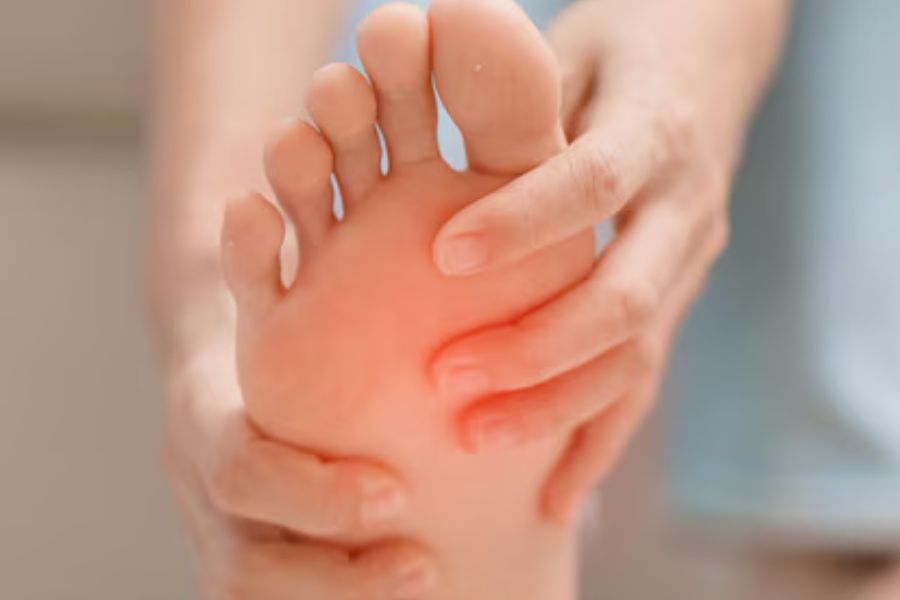Neuropathy Treatment in Wakad, Pimpri Chinchwad, Pune by Dr. Chetna Patil
Neuropathy, commonly referred to as nerve damage, is a condition that affects the peripheral nerves responsible for carrying messages between the brain, spinal cord, and the rest of the body. It can lead to symptoms such as numbness, tingling, burning pain, weakness, and loss of sensation, most commonly in the hands and feet. Neuropathy can significantly affect daily life if left untreated, making early diagnosis and proper management essential.

Causes of Neuropathy
Neuropathy can occur due to various underlying health conditions and lifestyle factors. The most common causes include:
- Diabetes (Diabetic Neuropathy) – prolonged high blood sugar levels damaging nerves.
- Vitamin deficiencies, especially B vitamins.
- Alcohol abuse and poor nutrition.
- Autoimmune diseases like lupus or Guillain-Barré syndrome.
- Infections such as shingles or HIV.
- Nerve compression or injury.
- Certain medications or toxins (chemotherapy-induced neuropathy).
- Genetic factors in some rare cases.
Symptoms of Neuropathy
The presentation may vary depending on which nerves are affected:
- Sensory nerves: Tingling, burning, sharp or stabbing pain, loss of sensation, or hypersensitivity to touch.
- Motor nerves: Muscle weakness, cramps, twitching, difficulty walking, or loss of coordination.
- Autonomic nerves: Digestive problems, changes in blood pressure, dizziness, or bladder issues.
Neuropathy Treatment in Pune by Dr. Chetna Patil
Dr. Chetna Patil, an experienced Neurologist & Neurophysician, provides comprehensive care for patients suffering from neuropathy. The treatment approach is personalized, focusing on controlling the underlying cause, relieving symptoms, and preventing further nerve damage.
1. Accurate Diagnosis
The first step is a thorough clinical evaluation which may include:
- Detailed history and physical examination.
- Blood tests to check for diabetes, vitamin levels, or thyroid dysfunction.
- Nerve conduction studies and electromyography (EMG).
- Imaging tests if nerve compression is suspected.
2. Medical Management
- Medications for nerve pain: Anti-seizure drugs, antidepressants, or pain-relieving medications to reduce burning and tingling sensations.
- Vitamin supplementation: Especially B-complex vitamins, if deficiency is detected.
- Medications for underlying diseases such as diabetes, thyroid disorders, or autoimmune conditions.
- Topical treatments like anesthetic creams or patches for localized relief.
3. Lifestyle & Supportive Care
- Blood sugar control in diabetic patients to prevent progression.
- Healthy diet rich in vitamins, minerals, and antioxidants.
- Regular exercise and physiotherapy to improve strength, balance, and mobility.
- Avoiding alcohol and smoking, which worsen nerve damage.
4. Advanced Therapies
For severe cases, Dr. Patil may recommend:
- Nerve stimulation therapies (TENS).
- Plasma exchange or immunoglobulin therapy for autoimmune-related neuropathy.
- Surgical intervention if a compressed nerve is the cause.
Why Choose Dr. Chetna Patil?
- Specialized in neurological disorders with expertise in neuropathy management.
- Focus on individualized treatment plans tailored to each patient’s needs.
- Holistic approach combining medical therapy, rehabilitation, and lifestyle guidance.
- Emphasis on early diagnosis and prevention of further complications.
Frequently Asked Questions
Neuropathy refers to damage or dysfunction of one or more nerves, usually causing symptoms like numbness, tingling, burning, weakness, or pain. It most often affects the hands and feet but can involve other parts of the body. Neuropathy can result from diabetes, vitamin deficiencies, infections, injuries, certain medications, or other medical conditions. The term “peripheral neuropathy” is commonly used when the damage affects nerves outside the brain and spinal cord.
Neuropathy in diabetes happens because long-term high blood sugar (glucose) damages the nerves and the small blood vessels that supply them. Over time, excess glucose can weaken the protective coating of nerves, disrupt nerve signaling, and reduce oxygen and nutrient supply. This leads to nerve injury, causing symptoms like numbness, tingling, burning, or pain—most commonly in the feet and hands. Other factors such as high blood pressure, high cholesterol, smoking, and duration of diabetes also increase the risk of developing diabetic neuropathy.
Neuropathy, which is nerve damage, cannot always be completely cured or reversed, especially if it is long-standing. The possibility of improvement depends on the underlying cause, severity, and how early it is detected.
Diabetic neuropathy: Strict blood sugar control can prevent further nerve damage and may improve some symptoms, but complete reversal is rare.
Vitamin deficiency-related neuropathy: Neuropathy caused by vitamin deficiencies (like B12) can often be reversed if treated early.
Toxin or medication-related neuropathy: Stopping the toxic agent early may allow nerves to recover over time.
Autoimmune or inflammatory neuropathy: Some types can improve with treatment like immunotherapy or steroids.
Management focuses on:
Controlling the underlying cause (diabetes, vitamin deficiency, etc.)
Relieving symptoms (pain, tingling, numbness)
Preventing complications (injuries due to loss of sensation)
Bottom line: Early diagnosis and treatment can slow progression, relieve symptoms, and sometimes partially reverse neuropathy, but full cure is often challenging.
Neuropathy occurs when nerves are damaged, and several factors can trigger this condition. Common triggers include:
Diabetes: High blood sugar over time can damage nerves, especially in the feet and hands.
Vitamin Deficiencies: Lack of vitamin B12, B1, or other essential nutrients can impair nerve function.
Alcohol Abuse: Excessive alcohol intake can lead to nerve damage over time.
Infections: Certain viral or bacterial infections (like shingles or Lyme disease) can affect nerves.
Medications: Some chemotherapy drugs, antibiotics, or medications for HIV can cause neuropathy.
Autoimmune Disorders: Conditions like lupus or rheumatoid arthritis can attack nerves.
Trauma or Injury: Physical injury, repetitive stress, or surgery can damage nerves.
Toxins: Exposure to heavy metals, industrial chemicals, or certain medications may trigger nerve damage.
Metabolic Disorders: Kidney or liver problems, thyroid issues, or other metabolic conditions can contribute.
Genetics: Some inherited conditions make nerves more susceptible to damage.
Neuropathy triggers vary from person to person, and sometimes multiple factors contribute. Early detection and addressing underlying causes are crucial to prevent progression.
Yes, having neuropathy does not usually prevent you from living a long life. Neuropathy itself is a nerve condition that can cause pain, numbness, tingling, or weakness, but it is not typically life-threatening. The key to maintaining a long and healthy life with neuropathy is proper management of the underlying cause and symptoms.
Important points:
Identify and treat the cause: Neuropathy can be caused by diabetes, vitamin deficiencies, infections, autoimmune diseases, or certain medications. Managing the root cause can slow or sometimes stop progression.
Symptom management: Pain, numbness, and weakness can be managed with medications, physical therapy, and lifestyle adjustments.
Prevent complications: Protecting affected areas, especially in diabetic neuropathy, can prevent injuries and infections.
Healthy lifestyle: Eating a balanced diet, staying active, avoiding smoking, and controlling blood sugar (if diabetic) help maintain overall health.
With careful management and regular medical care, many people with neuropathy lead full, active, and long lives.
Neuropathy and radiculopathy both involve nerve problems, but they affect different parts of the nervous system and have distinct causes and symptoms:
Neuropathy:
Definition: Damage or dysfunction of peripheral nerves (nerves outside the brain and spinal cord).
Causes: Diabetes, vitamin deficiencies, infections, toxins, autoimmune diseases, or chronic alcohol use.
Symptoms: Tingling, numbness, burning, or weakness in the hands, feet, or other areas; often symmetrical (both sides affected).
Pattern: Usually affects a specific type of nerve (sensory, motor, or autonomic) and may be “stocking-glove” in distribution for diabetic neuropathy.
Radiculopathy:
Definition: Compression or irritation of a nerve root where it exits the spine.
Causes: Herniated disc, spinal stenosis, bone spurs, or trauma.
Symptoms: Pain, numbness, or weakness along the specific nerve root distribution (dermatome or myotome); often asymmetrical and limited to one side.
Pattern: Follows the path of a single spinal nerve (e.g., pain from neck to arm in cervical radiculopathy, or lower back to leg in lumbar radiculopathy).
Summary:
Neuropathy → problem in the peripheral nerves themselves, usually more widespread.
Radiculopathy → problem at the nerve root, typically one-sided and follows a spinal nerve distribution.
Neuropathy and radiculopathy both involve nerve problems, but they affect different parts of the nervous system and have distinct causes and symptoms:
Neuropathy:
Definition: Damage or dysfunction of peripheral nerves (nerves outside the brain and spinal cord).
Causes: Diabetes, vitamin deficiencies, infections, toxins, autoimmune diseases, or chronic alcohol use.
Symptoms: Tingling, numbness, burning, or weakness in the hands, feet, or other areas; often symmetrical (both sides affected).
Pattern: Usually affects a specific type of nerve (sensory, motor, or autonomic) and may be “stocking-glove” in distribution for diabetic neuropathy.
Radiculopathy:
Definition: Compression or irritation of a nerve root where it exits the spine.
Causes: Herniated disc, spinal stenosis, bone spurs, or trauma.
Symptoms: Pain, numbness, or weakness along the specific nerve root distribution (dermatome or myotome); often asymmetrical and limited to one side.
Pattern: Follows the path of a single spinal nerve (e.g., pain from neck to arm in cervical radiculopathy, or lower back to leg in lumbar radiculopathy).
Summary:
Neuropathy → problem in the peripheral nerves themselves, usually more widespread.
Radiculopathy → problem at the nerve root, typically one-sided and follows a spinal nerve distribution.
Take the Next Step
If you are experiencing persistent numbness, tingling, or weakness, do not ignore these warning signs. Early intervention can prevent progression and improve quality of life.
Consult Dr. Chetna Patil for expert neuropathy treatment and regain control over your health.
Book an Appointment with The Best Neurologist in Pune & PCMC
Dr. Chetna Patil is a highly qualified neurologist, neurophysician in PCMC, Pune. She practices at Advanced Brain & Spine Clinic in Wakad, Pune. She has 12+ years of experience of treating patients with neurological diseases.
Our Services
Wakad
- +91 80108 66994
- Shop No. 115, 1st Floor, WESTWOOD ESTATES, opp. Mont Vert Tropez Road, Kaspate Wasti, Wakad, Pimpri-Chinchwad - 411057
- Mon to Sat/ 8 AM–10 PM
- absclinicwakad@gmail.com
Location
Copyright © 2026 – All rights reserved. Created and Maintained by – DMX DIGITAL
WhatsApp us


